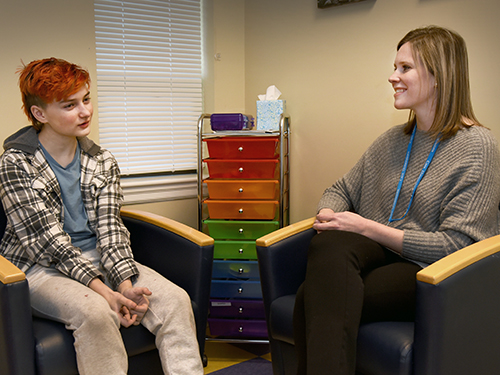How can we help?
888-283-1722
Call us now at 888-283-1722
24/7 Referrals and Nursing Support
Voices of Care Blog
.jpg)
Coping with Grief During COVID-19 Pandemic
Posted on April 21, 2020 by April Evans, LICSWYou’ve likely heard it said many times in the past month, by many people, in the media and in your own life: We are all in this together. We are all in the same boat. And that is true, and that fact is comforting. To an extent.
At the societal level, we are experiencing great anxiety for all that has suddenly become uncertain and unknown, such as:
- Who is carrying this virus?
- When will things return to normal?
- How will my family pay the basic bills?
- How can I comfort my loved ones when I cannot be in their presence?
We also are experiencing a collective grief for what we have already lost, such as our freedom to go where we want, when we want, without masks or gloves, hand sanitizer and disinfectant wipes. People grieve when facing the loss of someone or something they are attached to; human beings are hard-wired to form attachments and life is full of losses.
To continue with the shared boat analogy, some of us are fortunate enough to be sheltered in the boat’s warm and dry interior, while some of us who have just had a loved one die are out on the boat’s deck, in the strong wind and heavy rain.
The waves of grief
The grief we experience when someone we love dies is big and intense. Grief is often described as a wave that can arise suddenly and overtake us. To quote author Vicki Harrison: “Grief is like the ocean, it comes in waves, ebbing and flowing. Sometimes the water is calm and sometimes it is overwhelming. All we can do is learn to swim.”
But the new realities we are all living in right now can intensify and complicate the normal grief experience. How would you feel if you:
- Couldn’t visit your loved one during their last days or weeks due to visitation restrictions at nursing homes and assisted living residences?
- Couldn’t be with your loved one at the very end of their life, during their dying journey?
- Have missed important cultural rituals after death, such as body preparation, grieving at bedside, attending a wake, holding a traditional funeral, or even receiving a hug or being comforted by relatives and friends?
Big feelings of guilt, regret, sorrow, and a sense of confusion due to unfinished business can weigh extra heavy.
Some put a pause on grief
Meanwhile, many of our clients are describing a “Grief on Pause,” including a heightened sense of unreality. Sometimes it is difficult to allow ourselves to fully grieve our loved one who died because we know that so many people are grieving, and because of this strange space we are all inhabiting now. We may ask ourselves, “Do I have the right to grieve? The world has turned upside down and everyone is already upset; perhaps my loss isn’t so bad.” Also, with everyone around us already attending to their own anxiety and grief about COVID-19, they may not be as available to attend to our pain.
Despite the societal level of the crisis, we must name our grief and take it seriously if we are to maintain our emotional and psychological well-being.
Ways to validate grief
Here are a few tips on how to honor and validate your grief right now – both the societal level grief and the personal and intimate grief we feel for our loved one who has died:
- Physical movement, especially bi-lateral movement such as walking will calm your brain; yoga and stretching will help calm your nervous system, as will conscious breathing (the simplest is to count to four with your in-breath, then count to six with your out-breath; remember the longer exhale is crucial).
- Watch a movie that just makes you laugh, smile, or cry. Tears are a way to release tension and are believed to excrete stress-inducing hormones built up from emotional distress.
- Read poetry or literature that touches your soul.
- Meditation/mindfulness/breath (sign up for a virtual Yoga for Living with Loss class).
- Prayer, such as Psalms 23 or the beloved Serenity Prayer: God grant me the Serenity to accept the things I cannot change; Courage to change the things I can; and Wisdom to know the difference.
- Find ways to express your feelings of grief and anxiety (such as talking, writing, journaling, painting, knitting).
- Create your own ritual, such as lighting a candle each day in a sacred space you have set up in your home, with pictures of your loved one, precious objects that belonged to them such as a necklace or personal letter.
Visit the Grief page of the Care Dimensions website to find links to articles and resources that will help you to understand your grief, its ebbs and flows and the many ways it may reveal itself; knowledge can most certainly empower.
And remember, physical distancing is now a necessity, but you can stay in touch by telephone, email, text, Facebook, Zoom, or even the good old handwritten card or letter.
The Care Dimensions Bereavement Team wants you to know that, though it may certainly feel otherwise at any given moment, you are not alone. We are moving our grief support groups on-line and invite you to join us.
Download the Care Dimensions bereavement calendar of support group offerings.
About the author
April Evans, LICSW, is Bereavement Services Manager for Care Dimensions. She offers a monthly group for caregivers of people with life-limiting illness.
Additional Posts
Making Healing Connections in Grief Support Groups
Posted on March 25, 2024 by Bob Hagopian, M.Div., and Mary Beth GrimmCare Dimensions grief support groups offer a safe place where people who are grieving a loss can share their feelings with others who are in a similar situation. ...
Continue readingRemembering Loved Ones Around the Holidays
Posted on December 14, 2023 by Patrice DePasquale, MSW, LICSW, and Samantha McCarthy, MS, CCLSTo honor, remember, and celebrate your loved one around the holidays, try some of these rituals with your family. ...
Continue readingWhat to Say to a Grieving Child
Posted on November 16, 2023 by Samantha McCarthy, MS, CCLS, and Sarah Bujold, MS, CCLS in ChildrenTips on what to say -- and what not to say -- to a child who is grieving the death of someone important to them. ...
Continue readingAnyone—patient, family, care provider—can make a referral. Fill in the form online or call us today.
Since 1978, Care Dimensions, formerly Hospice of the North Shore, has provided comprehensive and compassionate care for individuals and families dealing with life-threatening illnesses. As the non-profit leader in advanced illness care, we offer services in over 100 communities in Massachusetts.
Copyright 2024 | Care Dimensions, 75 Sylvan Street, Suite B-102, Danvers, MA 01923 | 888-283-1722 | 978-774-7566 |









